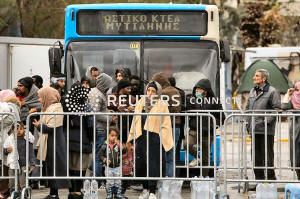Greece blocks 35,000 migrants, plans to deport arrivals after March 1
 Send a link to a friend
Send a link to a friend
 [March 05, 2020]
By Lefteris Papadimas and Bulent Usta [March 05, 2020]
By Lefteris Papadimas and Bulent Usta
KASTANIES, Greece/EDIRNE, Turkey (Reuters)
- Greece has repulsed nearly 35,000 migrants trying to cross onto its
territory illegally since Turkey opened its border nearly a week ago,
government sources said on Thursday, as it prepares to deport hundreds
of others who made it through.
Thousands of migrants have made for Greece since Ankara said on Feb. 28
that it would let migrants cross its borders into Europe, reneging on a
commitment to hold them on its territory under a 2016 deal with the
European Union.
Ankara has accused Greek forces of shooting dead four migrants. a charge
rejected by Athens, which says Turkish forces are helping the migrants
to cross the border. Both sides used tear gas at the Kastanies border
post on Wednesday.
Turkey's interior minister, Suleyman Soylu, visited Edirne province
bordering Greece on Thursday and announced the deployment of 1,000
special police to the area to halt the pushback of migrants toward its
territory.
Soylu, who said on Wednesday that Turkey was preparing a case at the
European Court of Human Rights over Greece's treatment of migrants,
accused Greek forces of wounding 164 people and pushing back nearly
5,000 into Turkey.

The situation at the Kastanies border crossing was calm on Thursday.
Migrants - many of whom are from Afghanistan and Pakistan as well as
Syria and other Arab nations - huddled in tents and makeshift camps on
the Turkish side of the border.
Greek border guards rebuffed nearly 7,000 attempts in the last 24 hours
alone, taking the total since Feb. 29 to 34,778 and the number of
arrests of those who got through to 244, the Greek government sources
said.
Migrants who arrived in Greece illegally after March 1 will be
transferred to the northern city of Serres and deported back to their
own countries, Greek Migration Minister Notis Mitarachi said late on
Wednesday.
"Our aim is to return them to their countries," he told the Athens News
Agency.
CRITICISM
Mitarachi also said migrants who entered Greece prior to Jan. 1, 2019
and are living on its Aegean islands would be transferred to the
mainland in the coming days.
[to top of second column]
|

Migrants, who are part of a group who arrived in the
previous days after crossing part of the Aegean Sea from
Turkey to Greece, wait for an identification process before
being transported to the mainland on a Greek Navy vessel
from the port of Mytilene, on the island of Lesbos, Greece,
March 5, 2020. REUTERS/Elias Marcou

Athens announced on March 1 that it would not accept any new asylum
applications for a month following the build-up of migrants at the
border. This has triggered criticism from human rights agencies.
The Aegean Sea remained choppy on Thursday and there were no further
sightings of dinghies carrying migrants to Lesbos and other Greek
islands from the nearby Turkish coast.
Lesbos already hosts more than 20,000 asylum seekers, many of them
living in filthy conditions in overcrowded camps
Greece and the EU accuse Turkey of deliberately goading the migrants
to cross the border as a way of pressuring Brussels into offering
more money or supporting Ankara's geopolitical aims in the Syrian
conflict.
Turkey, which already hosts 3.6 million Syrian refugees and faces
another influx from an upsurge in fighting in northwest Syria, says
it cannot take in any more and complains that EU aid falls well
short of what is needed for the refugees.
President Tayyip Erdogan discussed the migrant issue with senior EU
officials in Ankara on Wednesday but his spokesman said the
Europeans had made "no concrete proposition" on how to resolve the
crisis.
Ankara's change in policy toward the migrants on its soil came after
at least 33 Turkish soldiers were killed by Russian-backed Syrian
government forces in an air strike in Syria.
Erdogan flew to Moscow on Thursday for talks with Russia's President
Vladimir Putin over a potential ceasefire in Syria's Idlib, where
their militaries are facing off in a war that has displaced nearly a
million people in three months.

(Reporting by Lefteris Papadimas in Kastanies and Angeliki Koutantou
in Lesbos; writing by Foo Yun Chee; Editing by Gareth Jones)
[© 2020 Thomson Reuters. All rights
reserved.] Copyright 2020 Reuters. All rights reserved. This material may not be published,
broadcast, rewritten or redistributed.
Thompson Reuters is solely responsible for this content. |